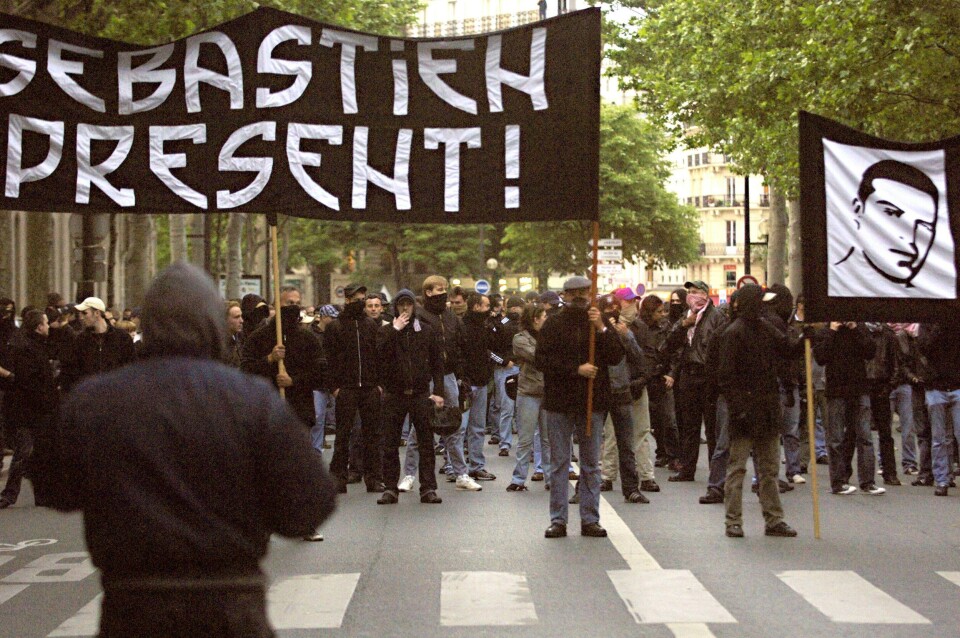-
Auvergne region is neglected by government
Government agencies and the SNCF shun the area 'time and time again', says reader
-
French minister to examine retiree citizenship rules amid claims they are too tough
Senator says ‘thousands’ of well-integrated people being refused on ‘foreign income’ grounds
-
France’s 1970s roller disco craze is back – and we tried it
Columnist Sarah Henshaw feels a yearning for a certain kind of retro fun
Far-right terrorism ‘is a real threat’ in France
A recent march by far-right activists in Paris caused controversy, but political scientist Stéphane François says it is the less visible extremists we should be worrying about

The sight of black-clad and masked protesters parading through central Paris has ignited debates about whether the threat of far-Right violence is taken as seriously as it should be in France.
Almost 600 people joined the march on May 6 to commemorate the death of far-Right activist Sébastien Deyzieu, 22, who fell from a building while escaping from the police on May 9, 1994.
The event takes place every year, but this year authorities were accused of complacency, having previously cracked down on pension protests.
Following the outcry, Interior Minister Gérald Darmanin instructed France’s prefects to ban all far-Right demonstrations, a move that has already been met with legal challenges.
French political scientist and specialist of the far-Right Stéphane François, who teaches at Université de Mons in Belgium, said: “Compared to certain years, there weren’t many people.
There have been May 6 protests with 1,000 to 1,500 people.”
The difference this year, he said, is the “context of polarisation”, and increasing tensions over France’s approach to the far-Right.
Danger warnings
“There is the Paris police prefect, Laurent Nuñez, a former intelligence chief who has been warning of the dangers of the far-Right for several years.
Then there is a very right-wing Interior Minister who is already thinking about the presidential election in four years.”
May also saw far-Right activists disrupt a children’s storytelling event held by drag queens in a library near Rennes, replicating protests held in the US.
Meanwhile, the mayor of Saint-Brevin-les-Pins (Loire-Atlantique) resigned after his cars and home were set on fire.
He had been targeted by extremists over plans to move an asylum seeker reception centre to a different part of town.
Read more: French mayor quits over fire at his home linked to asylum hub support
There was an escalation of violence in December when a shooter targeted a Kurdish cultural centre in Paris, killing three people.
Then, in April, a parliamentary assistant to a left-wing MP was attacked ahead of the final of the Coupe de France football competition.
The threat of violence comes from a subsection of the far-Right, variably referred to as the ultra-droite (ultraright) or droite radicale (radical right).
‘They seek to overthrow the system’
“They seek to overthrow the system, which means overthrowing the Republic,” Dr François said.
“They are extremists who want to move into action, who reject multicultural society and believe that a Muslim is never moderate, always an Islamist.”
There are an estimated 3,000 radical right activists in France, a figure that has remained relatively stable over the years.
“Those are the known activists who can be tracked across groups.
New profile emerging
But a new profile has appeared – people who are radicalised online, belong to no movement or group, and believe France is in decline and they must move into action.
We are starting to see what we call ‘accelerationists’, who want to start a race war in France to provoke a counter-shock.”
Their models are Norwegian terrorist Anders Breivik, and Brenton Tarrant, responsible for the Christchurch mosque shootings in 2019.
This group is less visible and thus harder to quantify, and far more dangerous, Dr François said.
“When people demonstrate like on May 6, they show their muscles and scare middle-class people and journalists.
We talk about them and they become the villains they want to be.
“Those who protest generally know there is a line they cannot cross.
They can be radicalised but they’re not stupid enough to act on it as they know they’re being tracked.
The others may be activists, but not in the foreground, or they might have left a party or group because all they did was talk or train, instead of moving into action.”
As well as the role of the internet in spreading extremist ideas, Dr François points to the radicalisation of the mainstream Right in France, which has sought to recover voters attracted by the far-Right.
Related to the normalisation of extremist ideas is a “quite phenomenal” rise in racism, he says.
‘Increasing radicalisation’
He believes there is little doubt the threat of far-Right terrorism is rising, “not necessarily in terms of the number of individuals, but in its intensity – there is an increasing radicalisation.”
“We are not necessarily talking about thousands of people preparing a coup d’état, but we could have people carrying out attacks, which was the case until the 1990s, before it fell away, and now it’s returning to a reasonably high level.
We are not yet at the level of the 1970s, with its neo-Nazi groups.”
Despite repeated warnings, he says the Interior Ministry has only begun taking the threat seriously in the last four or five years.
“We are paying for that delay.
We have an Interior Minister who for a long time was more focused on ‘leftists’, Islamists or ‘ecoterrorists’ than on the radical Right.”
Twenty-nine right-wing extremists were arrested in France in 2021, compared to five in 2020 and seven in 2019, according to Europol.
This is part of a global trend – a 2020 report from the UN’s Security Counterterrorism Committee revealed far-Right-inspired terror attacks had increased by 320% over the previous five years.
Related articles
Far-right supporters march in Paris to mark ‘Joan of Arc’ day
























